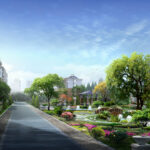The Future of Urban Planning in the GCC: Key Trends and Innovations
Outline
- Introduction
- Design and Planning Services
- Project and Construction Management
- Specialized Studies
- Urban Planning
- Buildings Design
- Infrastructure
- Architecture
- Interior Design
- Landscape Architecture
- Electrical & Mechanical
- Structural Design
- Roads & Transportation
- Water & Waste Water
- Economic and Feasibility Studies
- Environmental Studies & Planning
- Traffic and Transportation Studies
- Site Supervision
- Project Management Practices
- Programme Management
- Value Engineering
- Conclusion
- Frequently Asked Questions
- Get in Touch
Introduction
Urban planning in the GCC is rapidly evolving, influenced by technological advancements, sustainability initiatives, and economic growth. This article explores the key trends and innovations shaping the future of urban planning in the region, focusing on various sectors such as design and planning services, infrastructure, and architecture.
Design and Planning Services
Design and planning services are at the forefront of urban development in the GCC. The integration of smart city technology, including IoT and AI, is revolutionizing the way cities are designed and managed. These technologies enable more efficient resource management, enhance urban living experiences, and support sustainable development goals. Architects and planners are increasingly leveraging these tools to create responsive, adaptable urban environments.
Project and Construction Management
Effective project and construction management is critical to the successful delivery of urban projects. The use of Building Information Modeling (BIM) and other advanced project management tools is streamlining construction processes, improving accuracy, and reducing costs. These tools facilitate better collaboration among stakeholders, enhance project visibility, and ensure timely completion.
Specialized Studies
Specialized studies such as environmental impact assessments and feasibility studies play a crucial role in urban planning. These studies help identify potential challenges and opportunities, guiding decision-making and ensuring that projects align with sustainability and regulatory requirements. The use of advanced analytical tools and methodologies is enhancing the accuracy and relevance of these studies.
Urban Planning
Urban planning in the GCC is characterized by a focus on sustainability, innovation, and quality of life. Planners are integrating green spaces, smart infrastructure, and energy-efficient designs to create livable, resilient cities. The emphasis on sustainability is driving the adoption of eco-friendly materials, renewable energy sources, and sustainable transportation solutions.
Buildings Design
Building design is evolving to meet the demands of modern urban environments. The incorporation of smart building technologies, such as automated lighting and climate control systems, is enhancing building performance and occupant comfort. Architects are also focusing on adaptive reuse of existing structures and sustainable design practices to reduce the environmental impact of new developments.
Infrastructure
Infrastructure development is a key component of urban planning in the GCC. The region is investing heavily in transportation networks, utilities, and public facilities to support economic growth and improve quality of life. Innovations in infrastructure design, such as modular construction and smart grid technology, are driving efficiency and sustainability in these projects.
Architecture
Architectural trends in the GCC are characterized by a blend of traditional and contemporary styles, reflecting the region's rich cultural heritage and modern aspirations. Architects are exploring innovative design solutions, including parametric design and 3D printing, to create iconic structures that define the skyline and enhance urban identity.
Interior Design
Interior design plays a significant role in creating functional and aesthetically pleasing spaces. Designers are increasingly focusing on sustainability, comfort, and technology integration in their projects. The use of eco-friendly materials, smart home systems, and biophilic design principles is transforming interior environments and improving user experience.
Landscape Architecture
Landscape architecture is integral to urban planning, providing green spaces and recreational areas that enhance urban living. Landscape architects are designing multifunctional landscapes that promote biodiversity, manage stormwater, and create vibrant public spaces. The integration of sustainable practices and innovative design approaches is shaping the future of landscape architecture in the GCC.
Electrical & Mechanical
Electrical and mechanical engineering is essential to the functioning of urban infrastructure and buildings. Engineers are developing advanced systems for energy management, HVAC, and water treatment to support sustainable urban development. The integration of smart technologies and energy-efficient solutions is driving innovation in this field.
Structural Design
Structural design is a critical aspect of construction, ensuring the safety and stability of buildings and infrastructure. Advances in materials science and engineering techniques are enabling the creation of more resilient and efficient structures. Structural engineers are also incorporating sustainability considerations into their designs to reduce environmental impact.
Roads & Transportation
Transportation infrastructure is vital to the connectivity and functionality of urban areas. The GCC is investing in modern transportation systems, including smart traffic management and sustainable transit solutions. Innovations in transportation planning are aimed at reducing congestion, improving safety, and enhancing the efficiency of urban mobility.
Water & Waste Water
Water and wastewater management are crucial for maintaining environmental sustainability and public health. The GCC is implementing advanced technologies for water conservation, treatment, and recycling. Sustainable practices in water management are helping to address the challenges of water scarcity and ensure the availability of clean water for future generations.
Economic and Feasibility Studies
Economic and feasibility studies are essential for evaluating the viability and financial impact of urban projects. These studies provide insights into market conditions, cost estimates, and potential returns on investment. The use of data-driven analysis and modeling techniques is enhancing the accuracy and reliability of feasibility assessments.
Environmental Studies & Planning
Environmental studies and planning are integral to ensuring that urban development aligns with environmental regulations and sustainability goals. These studies assess the potential impact of projects on natural resources, ecosystems, and communities. The incorporation of environmental considerations into planning processes is promoting more sustainable and resilient urban environments.
Traffic and Transportation Studies
Traffic and transportation studies are key to understanding and managing urban mobility. These studies analyze traffic patterns, congestion, and transportation needs to inform planning and design decisions. Advanced modeling and simulation tools are being used to develop more effective traffic management strategies and improve overall transportation efficiency.
Site Supervision
Site supervision is critical to ensuring that construction projects are completed according to design specifications, quality standards, and safety regulations. Supervisors are responsible for monitoring progress, addressing issues, and coordinating between different stakeholders. Effective site supervision contributes to the successful delivery of projects and the achievement of project objectives.
Project Management Practices
Project management practices are essential for the successful execution of urban projects. These practices involve planning, organizing, and controlling resources to achieve project goals within scope, time, and budget constraints. The adoption of modern project management methodologies and tools is enhancing the efficiency and effectiveness of project delivery.
Programme Management
Programme management involves overseeing multiple related projects to achieve strategic objectives. It focuses on aligning projects with organizational goals, managing interdependencies, and optimizing resource allocation. Effective programme management ensures that projects are delivered in a coordinated manner, contributing to overall organizational success.
Value Engineering
Value engineering is a systematic approach to improving the value of projects by optimizing functionality, reducing costs, and enhancing performance. It involves analyzing project components and processes to identify opportunities for cost savings and efficiency improvements. The application of value engineering principles contributes to better project outcomes and increased value for stakeholders.
Conclusion
The future of urban planning in the GCC is characterized by innovation, sustainability, and technological advancements. By embracing these trends and leveraging modern tools and methodologies, the region is poised to create resilient, livable, and efficient urban environments. As urban planning continues to evolve, staying informed about key trends and innovations will be essential for professionals and stakeholders in the field.
Frequently Asked Questions
Key trends include the integration of smart city technology, sustainability initiatives, and advancements in design and planning services. The adoption of innovative tools and practices is transforming the way urban environments are planned and managed.
Technology is revolutionizing urban planning by enabling more efficient resource management, enhancing design and planning processes, and improving the overall quality of urban environments. Smart city technologies, AI, and IoT are key drivers of these changes.
Environmental studies assess the potential impact of urban projects on natural resources, ecosystems, and communities. They help ensure that development aligns with sustainability goals and regulatory requirements, contributing to more resilient and environmentally friendly urban environments.
Value engineering improves the value of projects by optimizing functionality, reducing costs, and enhancing performance. It involves analyzing project components and processes to identify opportunities for cost savings and efficiency improvements, leading to better project outcomes.
Building Information Modeling (BIM) enhances project management by providing a comprehensive digital representation of a building or infrastructure. It facilitates better collaboration, improves accuracy, reduces costs, and helps ensure timely completion of projects.
Get in Touch
If you have any questions or would like to discuss how CCG can assist with your urban planning projects, please contact us. We look forward to working with you!













